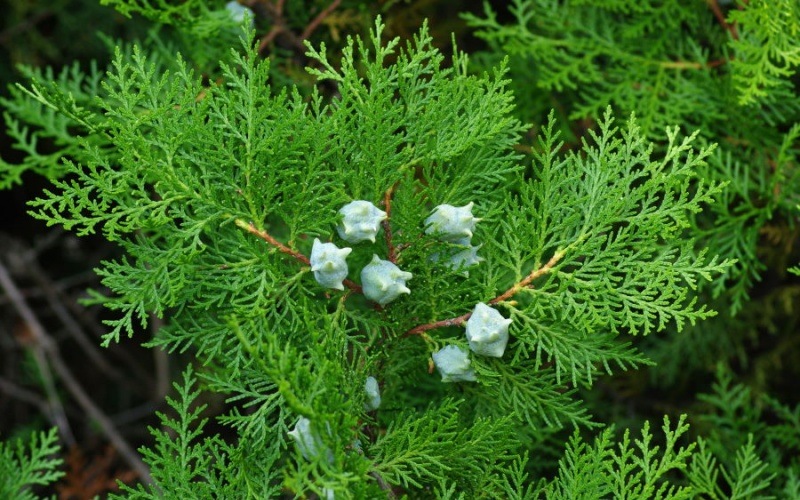What Is Thuja Orientalis?
Thuja orientalis, also known as Platycladus orientalis or Chinese arborvitae, is an evergreen tree widely used in traditional Chinese and Vietnamese medicine. The leaves, seeds, and branches are used for their medicinal properties.

🌱 Main Medicinal Parts:
- Leaves (Folium Thujae Orientalis)
- Seeds (Semen Biotae)
- Cones and twigs
💊 Health Benefits & Traditional Uses
1. Stops Bleeding (Hemostatic Effect)
- Used to treat coughing up blood, nosebleeds, bloody stools, and uterine bleeding.
- Promotes blood clotting.
2. Calms the Mind (Sedative)
- Especially the seeds are known to reduce anxiety, restlessness, and insomnia.
- Nourishes the heart and calms the spirit.
3. Promotes Hair Growth
- The leaves are often used in herbal hair tonics to treat hair loss and stimulate hair growth.
4. Anti-inflammatory and Antibacterial
- Helps treat skin infections, swelling, and minor wounds.
- Can be applied as a poultice or used in decoctions.
5. Supports Lung Health
- Used in cases of chronic cough, bronchitis, and respiratory inflammation.
6. Relieves Constipation
- The seeds (when used properly) have a mild laxative effect.
7. Cardiovascular Health
- Traditionally used to reduce palpitations, nervousness, and hypertension in herbal formulas.
⚗️ How to Use
✅ Internal Use (Decoction/Tea)
- Leaves: Dried leaves are boiled and consumed as herbal tea.
- Dosage: 6–12 grams per day, boiled in water.
- Seeds: Used to calm the mind and improve sleep.
- Dosage: 3–9 grams daily, often combined with other calming herbs.
Note: The seeds are often roasted before use to reduce their oil content and toxicity.
✅ External Use
- Crushed fresh leaves can be applied to stop bleeding wounds.
- Decoction of leaves can be used to wash the scalp to promote hair growth.
⚠️ Precautions & Warnings
- Toxic in high doses: Contains thujone, a compound that can be neurotoxic in large amounts.
- Not recommended for:
- Pregnant women (may cause uterine contractions)
- People with epilepsy or seizure disorders
- Always use under the guidance of a qualified herbalist or healthcare provider.
🧪 Storage
- Store dried leaves and seeds in a cool, dry place, away from direct sunlight.